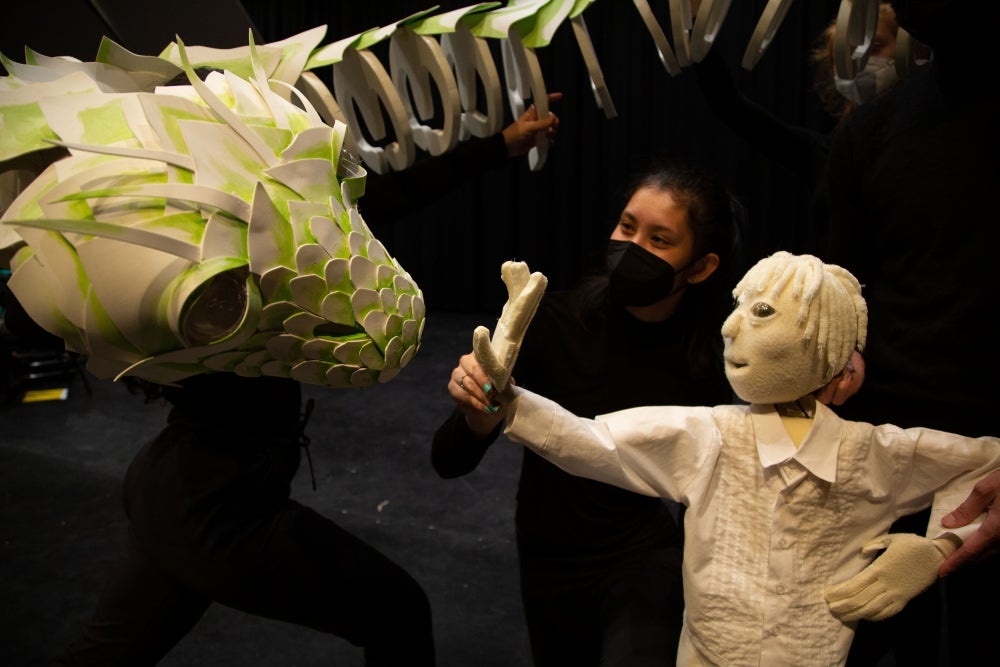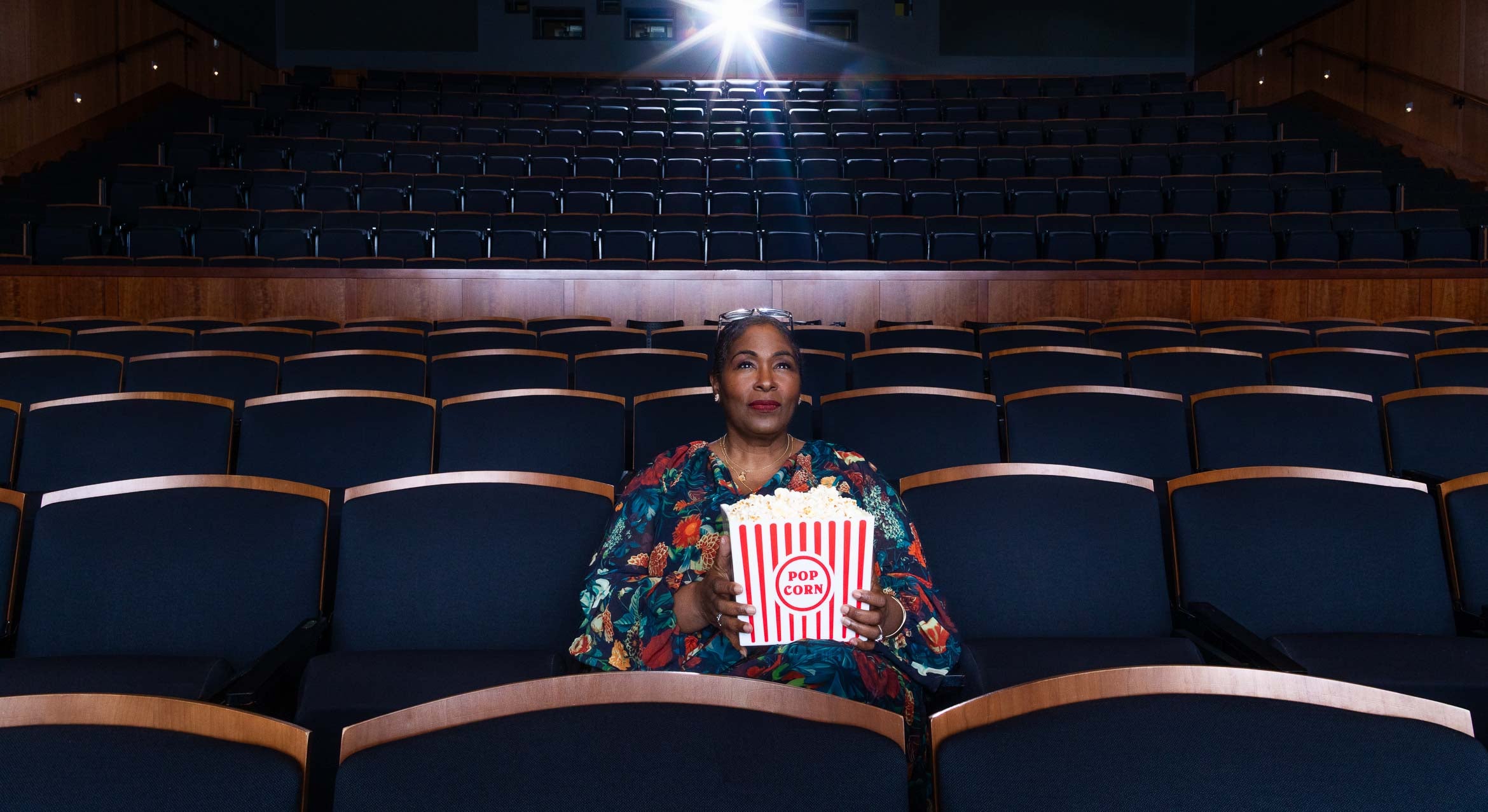A ‘Magic Flute’ Like No Other
Could COVID be a catalyst for creativity? That’s clearly the case with UC Santa Barbara’s upcoming staging of Mozart’s The Magic Flute. It’s a nontraditional, family-friendly production that conveys the essence of the whimsical yet emotionally resonant opera through dance and puppetry as well as music.
The production, a joint creation of the Departments of Music and Theater/Dance, was conceived and created in the midst of pandemic uncertainty. These challenging circumstances sparked the imagination of its creators, director Isabel Bayrakdarian and choreographer and visual artist Christina McCarthy.
“It’s a beautiful opportunity for everybody to stretch and grow,” said Bayrakdarian, who has appeared in countless productions of the opera, including at the Metropolitan Opera. “Half of the stage will be filled with the musicians and singers, and the other half will be the dancers and puppeteers. They are each telling the story using their own medium — their instruments, their voices, their bodies.”
This unique version of the 1791 masterpiece will premiere at 7:30 p.m. Feb. 25 and 26, and at 2 p.m. Feb. 27, in Lotte Lehmann Concert Hall on campus. It will be sung in English and run around 75 minutes with no intermission.
When she started thinking about the production a year or so ago, Bayrakdarian, a professor of music and head of the voice program, realized flexibility was a must. She needed a concept that could work either in person or on video, depending on what restrictions were in place at the time of its opening.
Mulling her options, she reasoned that puppets would translate well into any medium, and be a good fit for this fanciful opera. So she called McCarthy, whose work she had admired for years, and suggested they collaborate.
“That sounded really fun,” McCarthy recalled. “I started to listen to the opera and talk to her about it. I decided that a puppet show, by itself, wouldn’t support the opera’s nuanced and interesting storylines. I suggested doing a blend of dance and puppetry to illustrate the story while the singers are singing the opera.”
When Bayrakdarian responded enthusiastically, “I embarked on the process of figuring out what the puppets would look like, and how to integrate them with the bodies of the dancers,” McCarthy said. The results feel “almost like a live illustrated picture book. It’s intimate and direct. Sometimes the dancers are interacting with puppet figures; at other times, one puppet is interacting with another puppet. It’s very fluid and dynamic.
“A lot of storytelling happens in dance movement, as an interpretation of the opera’s emotions,” she continued. “I found myself gravitating towards having some of the more intense emotions being told through dancers’ bodies, while the comedy is told through the puppets.”
Her performers will be a mix of UCSB dance majors and professional dancers from the Santa Barbara community. All are “trained dancers, but they’re not trained puppeteers,” McCarthy noted. “They have jumped into this with so much energy and excitement. They’re contributing so much.”
The other side of the stage will feature a chamber ensemble of nine student instrumentalists, who will perform a new arrangement of the score by Peter Tiefenbach, along with seven vocalists, who will sing multiple roles. They’ll be using a new English-language translation by Brent Krysa which cuts some of the anachronistic elements of the original, a fairy tale inspired by Masonic ritual.
But one fundamental concept of the opera — the juxtaposition of perceived opposites and the search for wholeness — will be vividly embodied by this production. The musicians will be dressed in black and be placed in front of a white backdrop; the puppets, which are white, will be in front of a black backdrop.
Furthermore, “Because of the double casting, you have the same singer portraying characters who are, in many ways, opposites,” Bayrakdarian noted. “The person singing Papageno, who is the simplest character, is also singing Sarastro, who is the wisest. Tamino, our hero, is also singing the meanest male character, Monostatos.”
The young musicians — a mix of graduate students and undergraduates — are more than meeting this challenge, she added. “This is the best group of singers I’ve had in a long time here,” Bayrakdarian said. “I’m very lucky to have them, as well as the enthusiastic group of student chamber players.”
Bayrakdarian called McCarthy “a genius,” and McCarthy returned the compliment.
“I’m very grateful for this opportunity,” she said. “It is a huge project, but it’s exactly what I love to do as an artist. I love the engineering questions, such as ‘How do you make the birds look like they are flying?’ and ‘How do we make the lady spirits feel like they’re floating?’
“The exact movements that the dancers are making have everything to do with the puppets they are holding. The two are so linked.”
The production will live on beyond its opening weekend. Bayrakdarian is in talks with the New York City Opera to tour it to schools in the Big Apple later in the spring. She then hopes to take it to a number of Santa Barbara County schools, arguing that it’s “perfect for kids.”
McCarthy loves that idea. While she has worked extensively with theater and dance companies — a gigantic dragon puppet she created will make its debut in State Street Ballet’s production of Sleeping Beauty in March — this is her first opera production.
“Opera is so stylized and heightened that you can do almost anything,” she noted. “I’m hoping to work on fully staged operas in the future, and figure out my place in that world.”
Figuring out their place in the world is also the journey taken by the central characters of The Magic Flute. As McCarthy sees it, the piece, at its core, is about “the trials and travails of trying to find the right person to share your life with.”
“It’s about universal love,” agreed Bayrakdarian. “Mozart takes us to heaven and back with the music. It’s about finding a partner. It’s also about following your own truth. You know you’re on the right track if you are led by love.”
For ticket information, call (805) 893-2064, or go to https://campuscalendar.ucsb.edu/event/wolfgang_amadeus_mozarts_the_magi….





